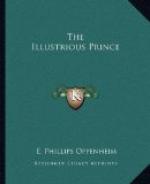“My dear Bransome,” he said, shaking hands, “isn’t this a little unreasonable of you? Business at this hour of the night! I was in the midst of a most amusing conversation with a delightful acquaintance of your wife’s, a young lady who turned up her nose at Hegel and had developed a philosophy of her own. I was just beginning to grasp its first principles. Nothing else, I am quite sure, would have kept me awake.”
Sir Edward leaned across the table towards Mr. Coulson. Mr. Coulson had risen to his feet.
“This gentleman,” he said, “is Mr. Smith.”
The newcomer opened his lips to protest, but Sir Edward held out his hand.
“One moment,” he begged. “Our friend here—Mr. J. B. Coulson from New York—has brought a letter from America. He is sailing tomorrow,—leaving London somewhere about eight o’clock in the morning, I imagine. He wishes to take back a verbal reply. The letter, you will understand, comes from a Mr. Jones, and the reply is delivered in the presence of—Mr. Smith. Our friend here is not personally concerned in these affairs. As a matter of fact, I believe he has been on the Continent exploiting some patents of his own invention.”
The newcomer accepted the burden of his altered nomenclature and took up the letter. He glanced at the signature, and his manner became at once more interested. He accepted the chair which Sir Edward had placed by his side, and, drawing the electric light a little nearer, read the document through, word by word. Then he folded it up, and glanced first at his colleague and afterwards at Mr. Coulson.
“I understand,” he said, “that this is a private inquiry from a private gentleman, who is entitled, however, to as much courtesy as it is possible for us to show him.”
“That is exactly the position, sir,” Mr. Coulson replied. “Negotiations of a more formal character are naturally conducted between your Foreign Office and the Foreign Office of my country. These few lines come from man to man. I think that it occurred to my friend that it might save a great deal of trouble, a great deal of specious diplomacy, and a great many hundred pages of labored despatches, if, at the bottom of it all, he knew your true feelings concerning this question. It is, after all, a simple matter,” Mr. Coulson continued, “and yet it is a matter with so many ramifications that after much discussion it might become a veritable chaos.”
Mr. Smith inclined his head gently.
“I appreciate the situation,” he said. “My friend here—Sir Edward Bransome—and I have already discussed the matter at great length. We have also had the benefit of the advice and help of a greater Foreign Minister than either of us could ever hope to become. I see no objection to giving you the verbal reply you ask for. Do you, Bransome?”
“None whatever, sir.”
“I leave it to you to put it in your own words,” Mr. Smith continued. “The affair is within your province, and the policy of His Majesty’s Ministers is absolutely fixed.”




